Masters of Professional Accounting: Nepal Accounting Standards Impact
VerifiedAdded on 2023/06/10
|10
|1445
|216
Report
AI Summary
This research report, prepared for a Masters of Professional Accounting program, examines the impact of International Financial Reporting Standards (IFRS) and Nepal Financial Reporting Standards (NFRS) on small businesses in Nepal. The study investigates the challenges faced during the adoption of these standards, focusing on the real changes in accounting practices, the aspects of the standards that have the most impact, and the future role of these standards in the Nepalese business environment. The research explores the background of globalization and liberalization, which prompted the adoption of IFRS in Nepal, and highlights the problems encountered during the transition to NFRS, including lack of preparedness. Data collection primarily involved secondary sources, including official websites, discussion papers, newspaper articles, newsletters, and reports from international organizations such as the World Bank and IMF. Ethical considerations, particularly regarding data integrity and confidentiality of interviewees, were carefully addressed. The research aims to understand the specific impacts on small businesses, including cottage industries and craftsmanship-based businesses, and to assess the future role and implementation of these standards within the Nepalese context.
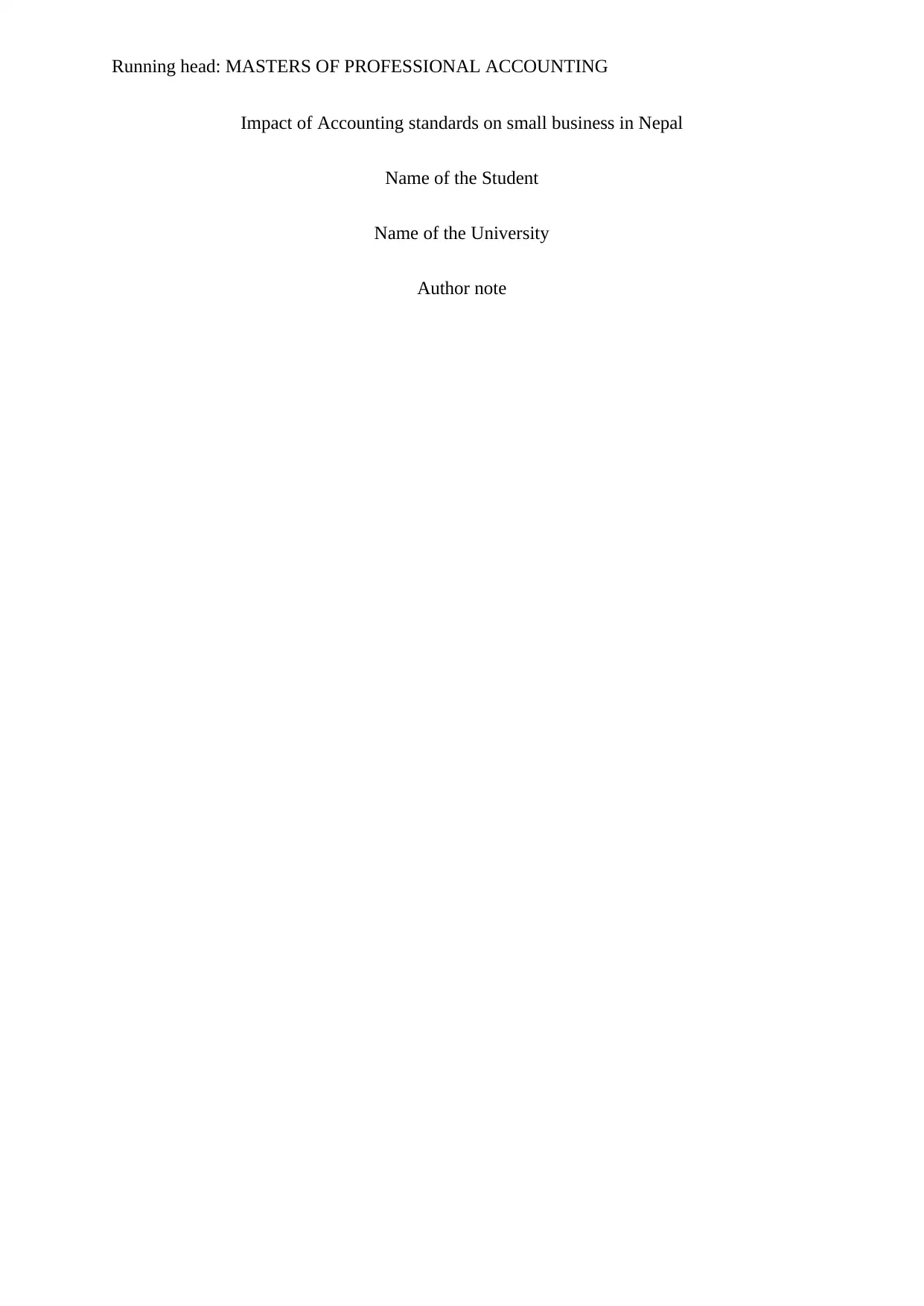
Running head: MASTERS OF PROFESSIONAL ACCOUNTING
Impact of Accounting standards on small business in Nepal
Name of the Student
Name of the University
Author note
Impact of Accounting standards on small business in Nepal
Name of the Student
Name of the University
Author note
Paraphrase This Document
Need a fresh take? Get an instant paraphrase of this document with our AI Paraphraser
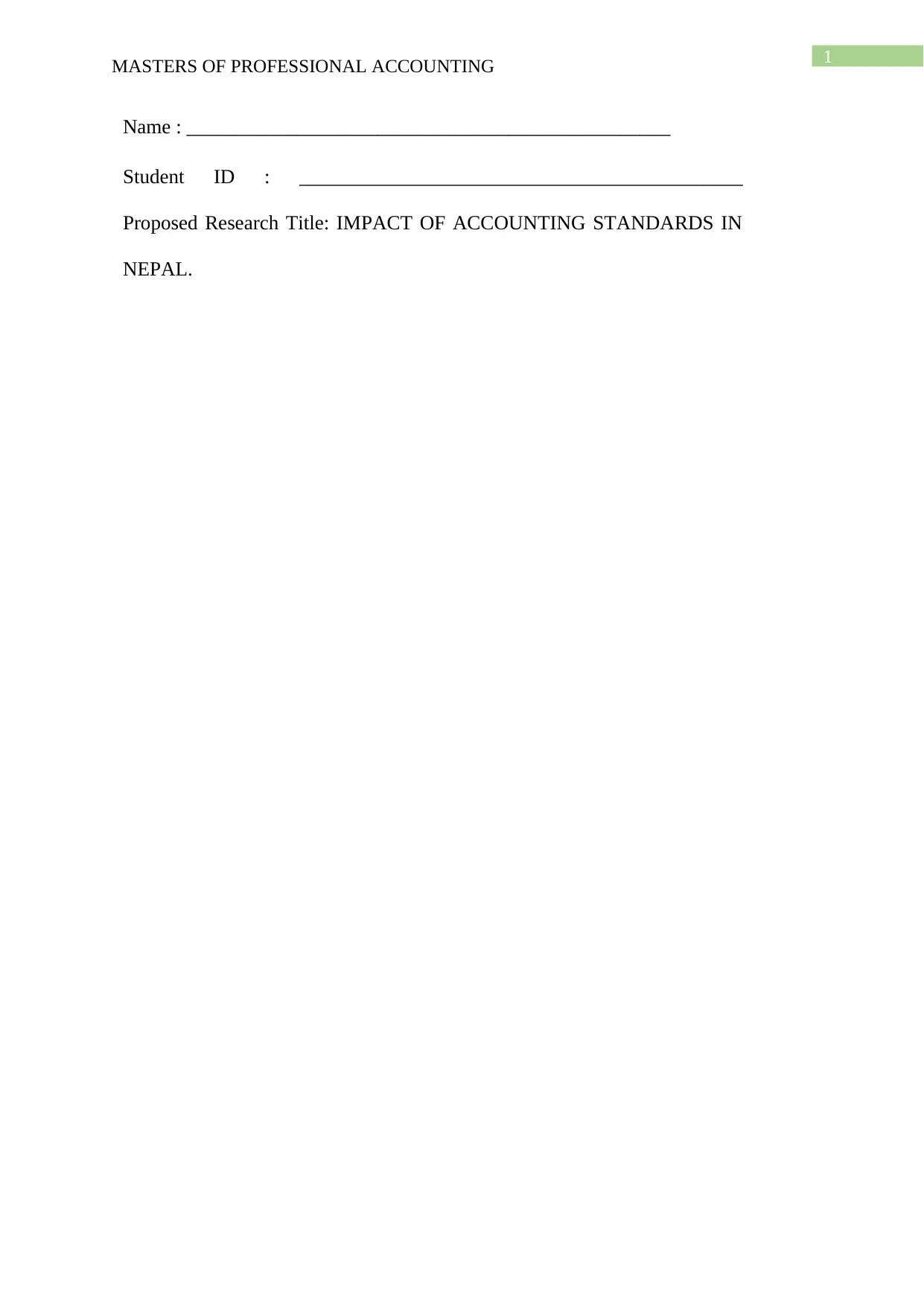
1
MASTERS OF PROFESSIONAL ACCOUNTING
Name : ________________________________________________
Student ID : ____________________________________________
Proposed Research Title: IMPACT OF ACCOUNTING STANDARDS IN
NEPAL.
MASTERS OF PROFESSIONAL ACCOUNTING
Name : ________________________________________________
Student ID : ____________________________________________
Proposed Research Title: IMPACT OF ACCOUNTING STANDARDS IN
NEPAL.
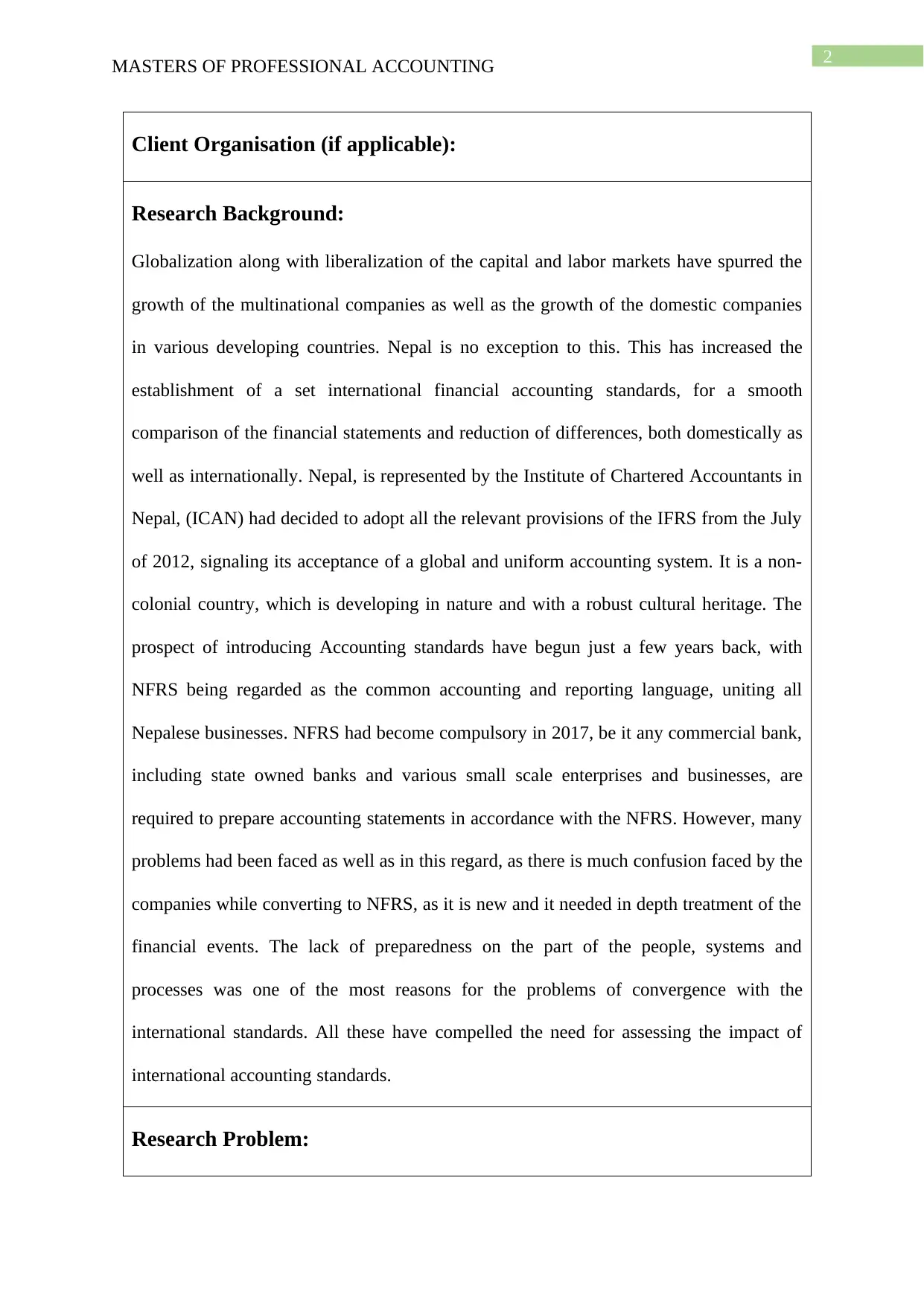
2
MASTERS OF PROFESSIONAL ACCOUNTING
Client Organisation (if applicable):
Research Background:
Globalization along with liberalization of the capital and labor markets have spurred the
growth of the multinational companies as well as the growth of the domestic companies
in various developing countries. Nepal is no exception to this. This has increased the
establishment of a set international financial accounting standards, for a smooth
comparison of the financial statements and reduction of differences, both domestically as
well as internationally. Nepal, is represented by the Institute of Chartered Accountants in
Nepal, (ICAN) had decided to adopt all the relevant provisions of the IFRS from the July
of 2012, signaling its acceptance of a global and uniform accounting system. It is a non-
colonial country, which is developing in nature and with a robust cultural heritage. The
prospect of introducing Accounting standards have begun just a few years back, with
NFRS being regarded as the common accounting and reporting language, uniting all
Nepalese businesses. NFRS had become compulsory in 2017, be it any commercial bank,
including state owned banks and various small scale enterprises and businesses, are
required to prepare accounting statements in accordance with the NFRS. However, many
problems had been faced as well as in this regard, as there is much confusion faced by the
companies while converting to NFRS, as it is new and it needed in depth treatment of the
financial events. The lack of preparedness on the part of the people, systems and
processes was one of the most reasons for the problems of convergence with the
international standards. All these have compelled the need for assessing the impact of
international accounting standards.
Research Problem:
MASTERS OF PROFESSIONAL ACCOUNTING
Client Organisation (if applicable):
Research Background:
Globalization along with liberalization of the capital and labor markets have spurred the
growth of the multinational companies as well as the growth of the domestic companies
in various developing countries. Nepal is no exception to this. This has increased the
establishment of a set international financial accounting standards, for a smooth
comparison of the financial statements and reduction of differences, both domestically as
well as internationally. Nepal, is represented by the Institute of Chartered Accountants in
Nepal, (ICAN) had decided to adopt all the relevant provisions of the IFRS from the July
of 2012, signaling its acceptance of a global and uniform accounting system. It is a non-
colonial country, which is developing in nature and with a robust cultural heritage. The
prospect of introducing Accounting standards have begun just a few years back, with
NFRS being regarded as the common accounting and reporting language, uniting all
Nepalese businesses. NFRS had become compulsory in 2017, be it any commercial bank,
including state owned banks and various small scale enterprises and businesses, are
required to prepare accounting statements in accordance with the NFRS. However, many
problems had been faced as well as in this regard, as there is much confusion faced by the
companies while converting to NFRS, as it is new and it needed in depth treatment of the
financial events. The lack of preparedness on the part of the people, systems and
processes was one of the most reasons for the problems of convergence with the
international standards. All these have compelled the need for assessing the impact of
international accounting standards.
Research Problem:
⊘ This is a preview!⊘
Do you want full access?
Subscribe today to unlock all pages.

Trusted by 1+ million students worldwide
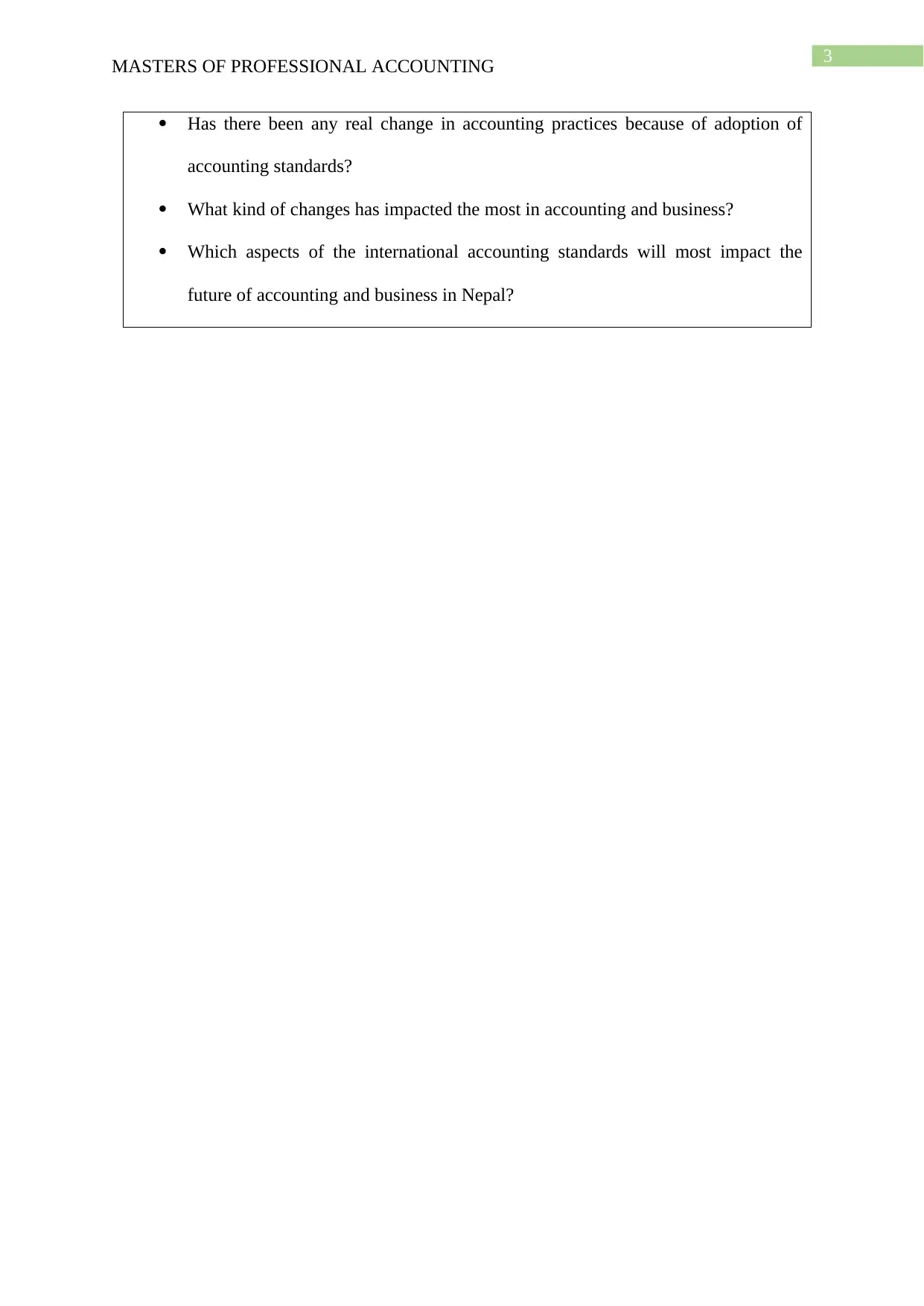
3
MASTERS OF PROFESSIONAL ACCOUNTING
Has there been any real change in accounting practices because of adoption of
accounting standards?
What kind of changes has impacted the most in accounting and business?
Which aspects of the international accounting standards will most impact the
future of accounting and business in Nepal?
MASTERS OF PROFESSIONAL ACCOUNTING
Has there been any real change in accounting practices because of adoption of
accounting standards?
What kind of changes has impacted the most in accounting and business?
Which aspects of the international accounting standards will most impact the
future of accounting and business in Nepal?
Paraphrase This Document
Need a fresh take? Get an instant paraphrase of this document with our AI Paraphraser
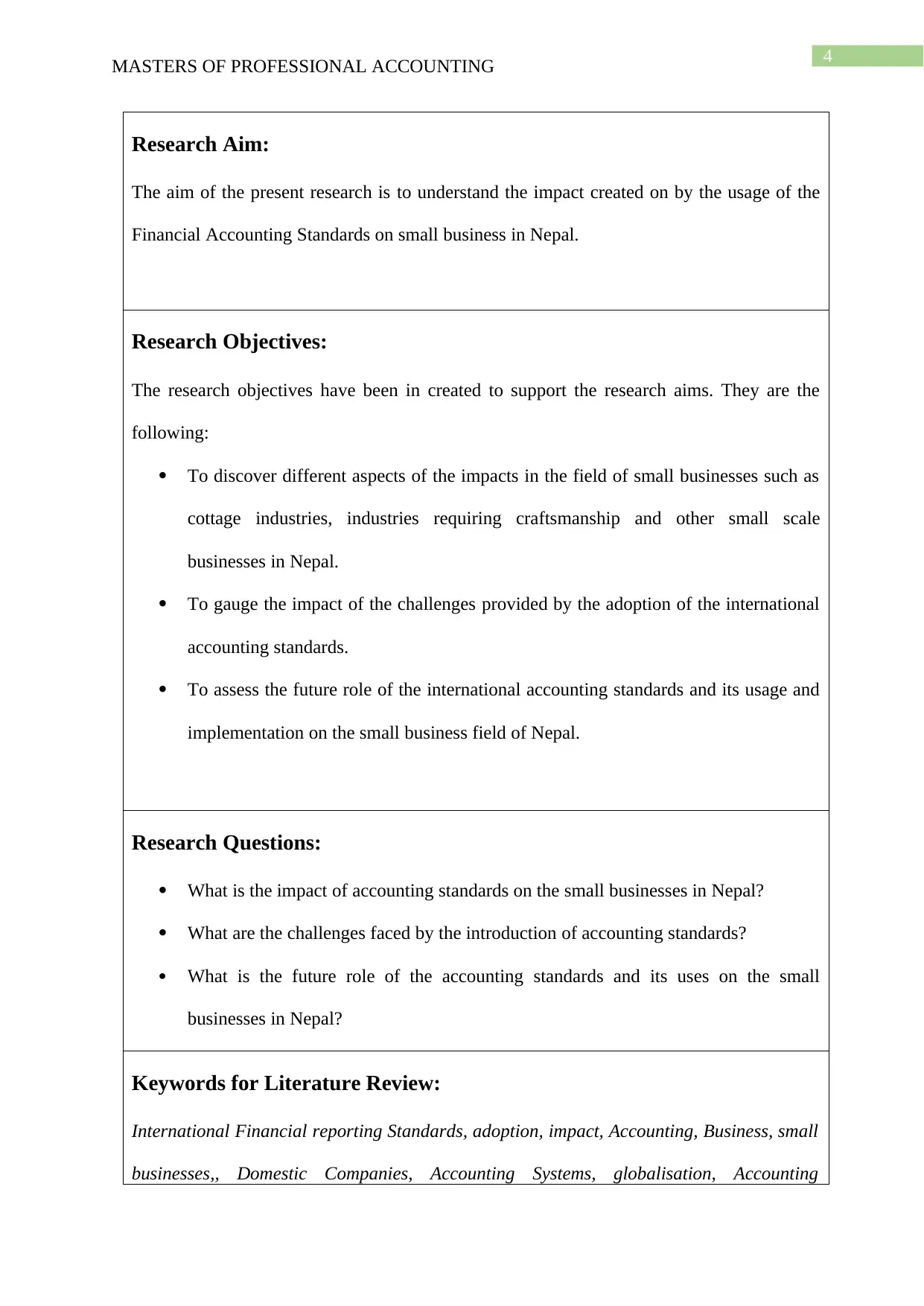
4
MASTERS OF PROFESSIONAL ACCOUNTING
Research Aim:
The aim of the present research is to understand the impact created on by the usage of the
Financial Accounting Standards on small business in Nepal.
Research Objectives:
The research objectives have been in created to support the research aims. They are the
following:
To discover different aspects of the impacts in the field of small businesses such as
cottage industries, industries requiring craftsmanship and other small scale
businesses in Nepal.
To gauge the impact of the challenges provided by the adoption of the international
accounting standards.
To assess the future role of the international accounting standards and its usage and
implementation on the small business field of Nepal.
Research Questions:
What is the impact of accounting standards on the small businesses in Nepal?
What are the challenges faced by the introduction of accounting standards?
What is the future role of the accounting standards and its uses on the small
businesses in Nepal?
Keywords for Literature Review:
International Financial reporting Standards, adoption, impact, Accounting, Business, small
businesses,, Domestic Companies, Accounting Systems, globalisation, Accounting
MASTERS OF PROFESSIONAL ACCOUNTING
Research Aim:
The aim of the present research is to understand the impact created on by the usage of the
Financial Accounting Standards on small business in Nepal.
Research Objectives:
The research objectives have been in created to support the research aims. They are the
following:
To discover different aspects of the impacts in the field of small businesses such as
cottage industries, industries requiring craftsmanship and other small scale
businesses in Nepal.
To gauge the impact of the challenges provided by the adoption of the international
accounting standards.
To assess the future role of the international accounting standards and its usage and
implementation on the small business field of Nepal.
Research Questions:
What is the impact of accounting standards on the small businesses in Nepal?
What are the challenges faced by the introduction of accounting standards?
What is the future role of the accounting standards and its uses on the small
businesses in Nepal?
Keywords for Literature Review:
International Financial reporting Standards, adoption, impact, Accounting, Business, small
businesses,, Domestic Companies, Accounting Systems, globalisation, Accounting

5
MASTERS OF PROFESSIONAL ACCOUNTING
framework.
MASTERS OF PROFESSIONAL ACCOUNTING
framework.
⊘ This is a preview!⊘
Do you want full access?
Subscribe today to unlock all pages.

Trusted by 1+ million students worldwide
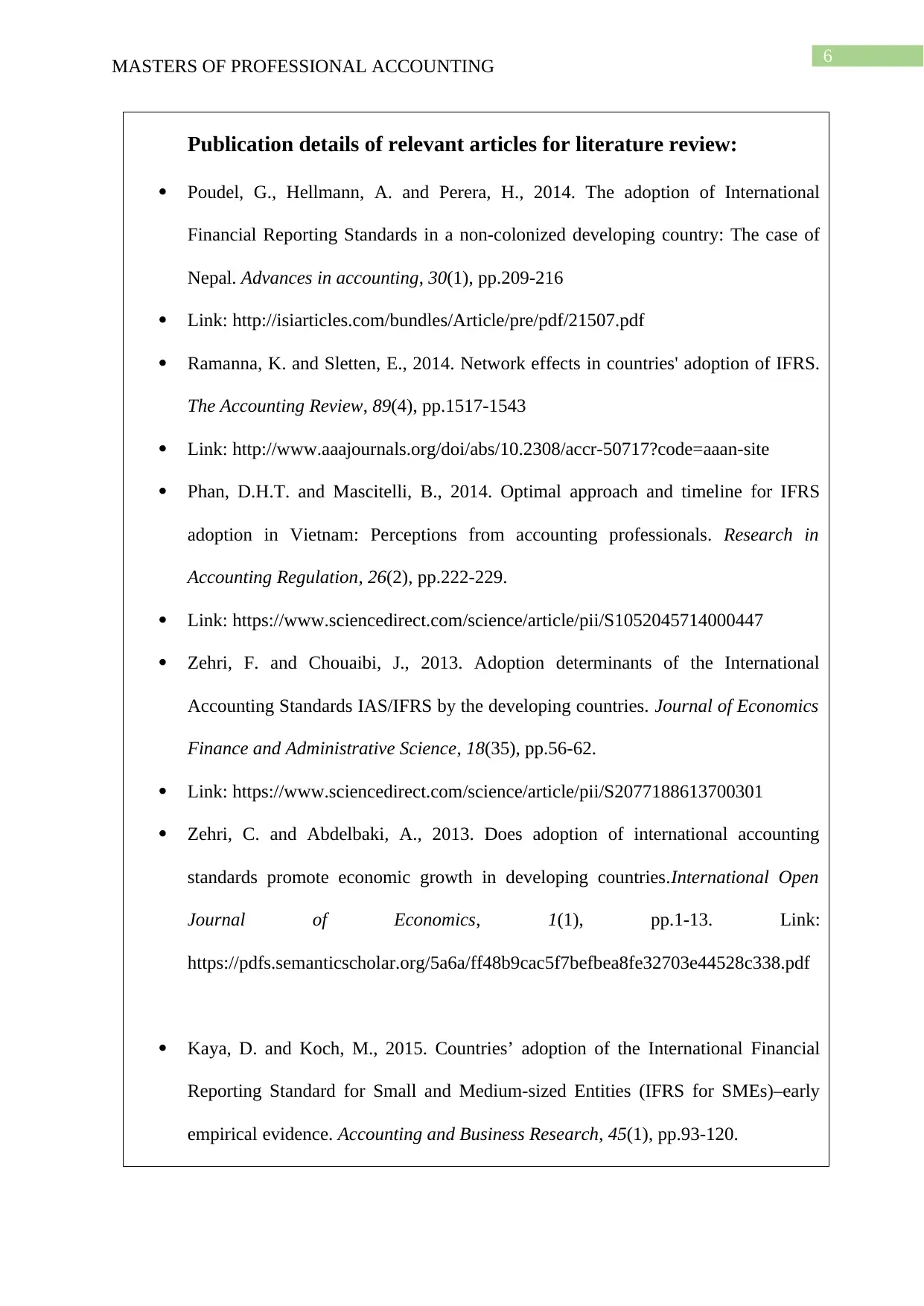
6
MASTERS OF PROFESSIONAL ACCOUNTING
Publication details of relevant articles for literature review:
Poudel, G., Hellmann, A. and Perera, H., 2014. The adoption of International
Financial Reporting Standards in a non-colonized developing country: The case of
Nepal. Advances in accounting, 30(1), pp.209-216
Link: http://isiarticles.com/bundles/Article/pre/pdf/21507.pdf
Ramanna, K. and Sletten, E., 2014. Network effects in countries' adoption of IFRS.
The Accounting Review, 89(4), pp.1517-1543
Link: http://www.aaajournals.org/doi/abs/10.2308/accr-50717?code=aaan-site
Phan, D.H.T. and Mascitelli, B., 2014. Optimal approach and timeline for IFRS
adoption in Vietnam: Perceptions from accounting professionals. Research in
Accounting Regulation, 26(2), pp.222-229.
Link: https://www.sciencedirect.com/science/article/pii/S1052045714000447
Zehri, F. and Chouaibi, J., 2013. Adoption determinants of the International
Accounting Standards IAS/IFRS by the developing countries. Journal of Economics
Finance and Administrative Science, 18(35), pp.56-62.
Link: https://www.sciencedirect.com/science/article/pii/S2077188613700301
Zehri, C. and Abdelbaki, A., 2013. Does adoption of international accounting
standards promote economic growth in developing countries.International Open
Journal of Economics, 1(1), pp.1-13. Link:
https://pdfs.semanticscholar.org/5a6a/ff48b9cac5f7befbea8fe32703e44528c338.pdf
Kaya, D. and Koch, M., 2015. Countries’ adoption of the International Financial
Reporting Standard for Small and Medium-sized Entities (IFRS for SMEs)–early
empirical evidence. Accounting and Business Research, 45(1), pp.93-120.
MASTERS OF PROFESSIONAL ACCOUNTING
Publication details of relevant articles for literature review:
Poudel, G., Hellmann, A. and Perera, H., 2014. The adoption of International
Financial Reporting Standards in a non-colonized developing country: The case of
Nepal. Advances in accounting, 30(1), pp.209-216
Link: http://isiarticles.com/bundles/Article/pre/pdf/21507.pdf
Ramanna, K. and Sletten, E., 2014. Network effects in countries' adoption of IFRS.
The Accounting Review, 89(4), pp.1517-1543
Link: http://www.aaajournals.org/doi/abs/10.2308/accr-50717?code=aaan-site
Phan, D.H.T. and Mascitelli, B., 2014. Optimal approach and timeline for IFRS
adoption in Vietnam: Perceptions from accounting professionals. Research in
Accounting Regulation, 26(2), pp.222-229.
Link: https://www.sciencedirect.com/science/article/pii/S1052045714000447
Zehri, F. and Chouaibi, J., 2013. Adoption determinants of the International
Accounting Standards IAS/IFRS by the developing countries. Journal of Economics
Finance and Administrative Science, 18(35), pp.56-62.
Link: https://www.sciencedirect.com/science/article/pii/S2077188613700301
Zehri, C. and Abdelbaki, A., 2013. Does adoption of international accounting
standards promote economic growth in developing countries.International Open
Journal of Economics, 1(1), pp.1-13. Link:
https://pdfs.semanticscholar.org/5a6a/ff48b9cac5f7befbea8fe32703e44528c338.pdf
Kaya, D. and Koch, M., 2015. Countries’ adoption of the International Financial
Reporting Standard for Small and Medium-sized Entities (IFRS for SMEs)–early
empirical evidence. Accounting and Business Research, 45(1), pp.93-120.
Paraphrase This Document
Need a fresh take? Get an instant paraphrase of this document with our AI Paraphraser

7
MASTERS OF PROFESSIONAL ACCOUNTING
Link:https://www.tandfonline.com/doi/abs/10.1080/00014788.2014.969188
MASTERS OF PROFESSIONAL ACCOUNTING
Link:https://www.tandfonline.com/doi/abs/10.1080/00014788.2014.969188
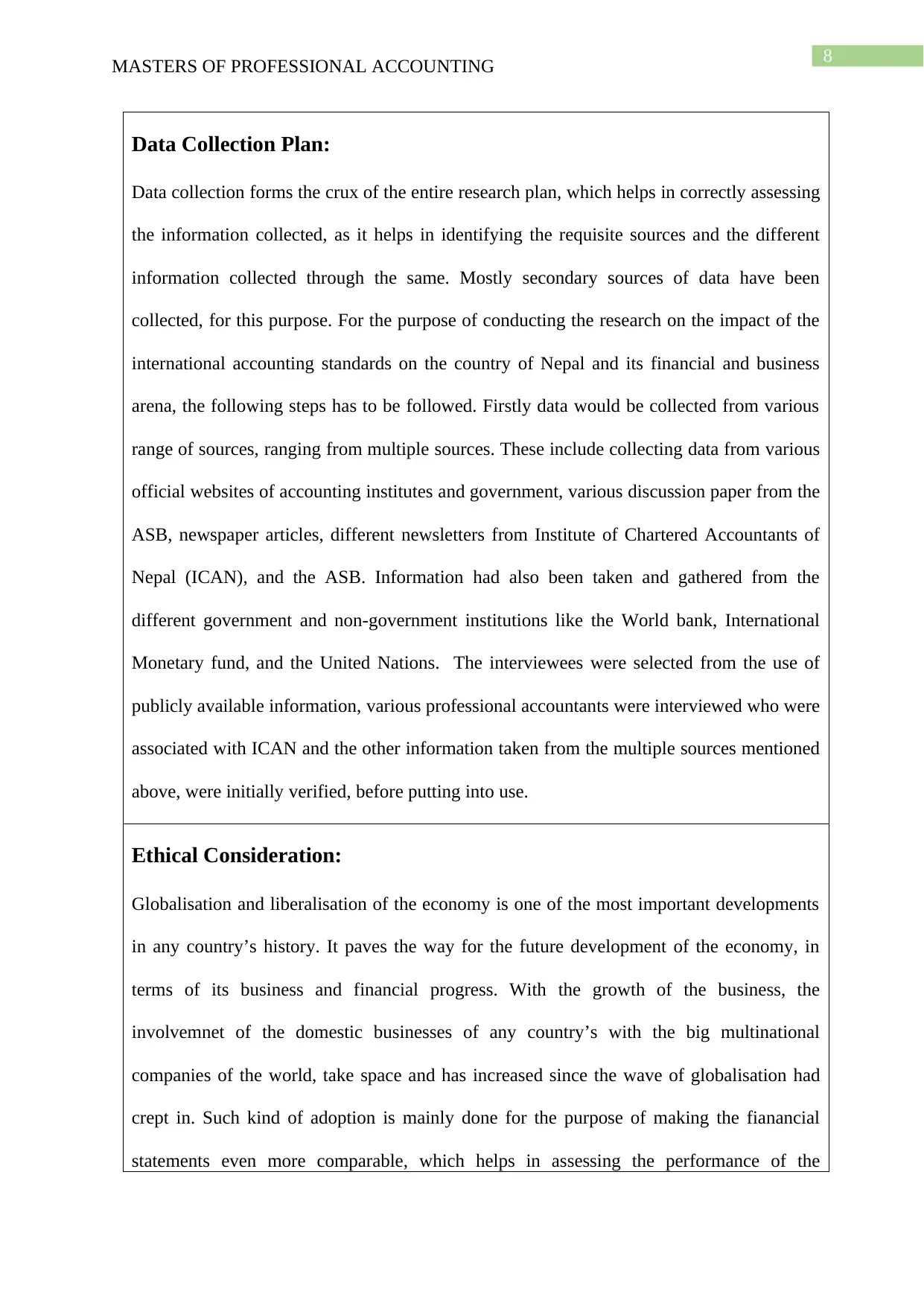
8
MASTERS OF PROFESSIONAL ACCOUNTING
Data Collection Plan:
Data collection forms the crux of the entire research plan, which helps in correctly assessing
the information collected, as it helps in identifying the requisite sources and the different
information collected through the same. Mostly secondary sources of data have been
collected, for this purpose. For the purpose of conducting the research on the impact of the
international accounting standards on the country of Nepal and its financial and business
arena, the following steps has to be followed. Firstly data would be collected from various
range of sources, ranging from multiple sources. These include collecting data from various
official websites of accounting institutes and government, various discussion paper from the
ASB, newspaper articles, different newsletters from Institute of Chartered Accountants of
Nepal (ICAN), and the ASB. Information had also been taken and gathered from the
different government and non-government institutions like the World bank, International
Monetary fund, and the United Nations. The interviewees were selected from the use of
publicly available information, various professional accountants were interviewed who were
associated with ICAN and the other information taken from the multiple sources mentioned
above, were initially verified, before putting into use.
Ethical Consideration:
Globalisation and liberalisation of the economy is one of the most important developments
in any country’s history. It paves the way for the future development of the economy, in
terms of its business and financial progress. With the growth of the business, the
involvemnet of the domestic businesses of any country’s with the big multinational
companies of the world, take space and has increased since the wave of globalisation had
crept in. Such kind of adoption is mainly done for the purpose of making the fianancial
statements even more comparable, which helps in assessing the performance of the
MASTERS OF PROFESSIONAL ACCOUNTING
Data Collection Plan:
Data collection forms the crux of the entire research plan, which helps in correctly assessing
the information collected, as it helps in identifying the requisite sources and the different
information collected through the same. Mostly secondary sources of data have been
collected, for this purpose. For the purpose of conducting the research on the impact of the
international accounting standards on the country of Nepal and its financial and business
arena, the following steps has to be followed. Firstly data would be collected from various
range of sources, ranging from multiple sources. These include collecting data from various
official websites of accounting institutes and government, various discussion paper from the
ASB, newspaper articles, different newsletters from Institute of Chartered Accountants of
Nepal (ICAN), and the ASB. Information had also been taken and gathered from the
different government and non-government institutions like the World bank, International
Monetary fund, and the United Nations. The interviewees were selected from the use of
publicly available information, various professional accountants were interviewed who were
associated with ICAN and the other information taken from the multiple sources mentioned
above, were initially verified, before putting into use.
Ethical Consideration:
Globalisation and liberalisation of the economy is one of the most important developments
in any country’s history. It paves the way for the future development of the economy, in
terms of its business and financial progress. With the growth of the business, the
involvemnet of the domestic businesses of any country’s with the big multinational
companies of the world, take space and has increased since the wave of globalisation had
crept in. Such kind of adoption is mainly done for the purpose of making the fianancial
statements even more comparable, which helps in assessing the performance of the
⊘ This is a preview!⊘
Do you want full access?
Subscribe today to unlock all pages.

Trusted by 1+ million students worldwide
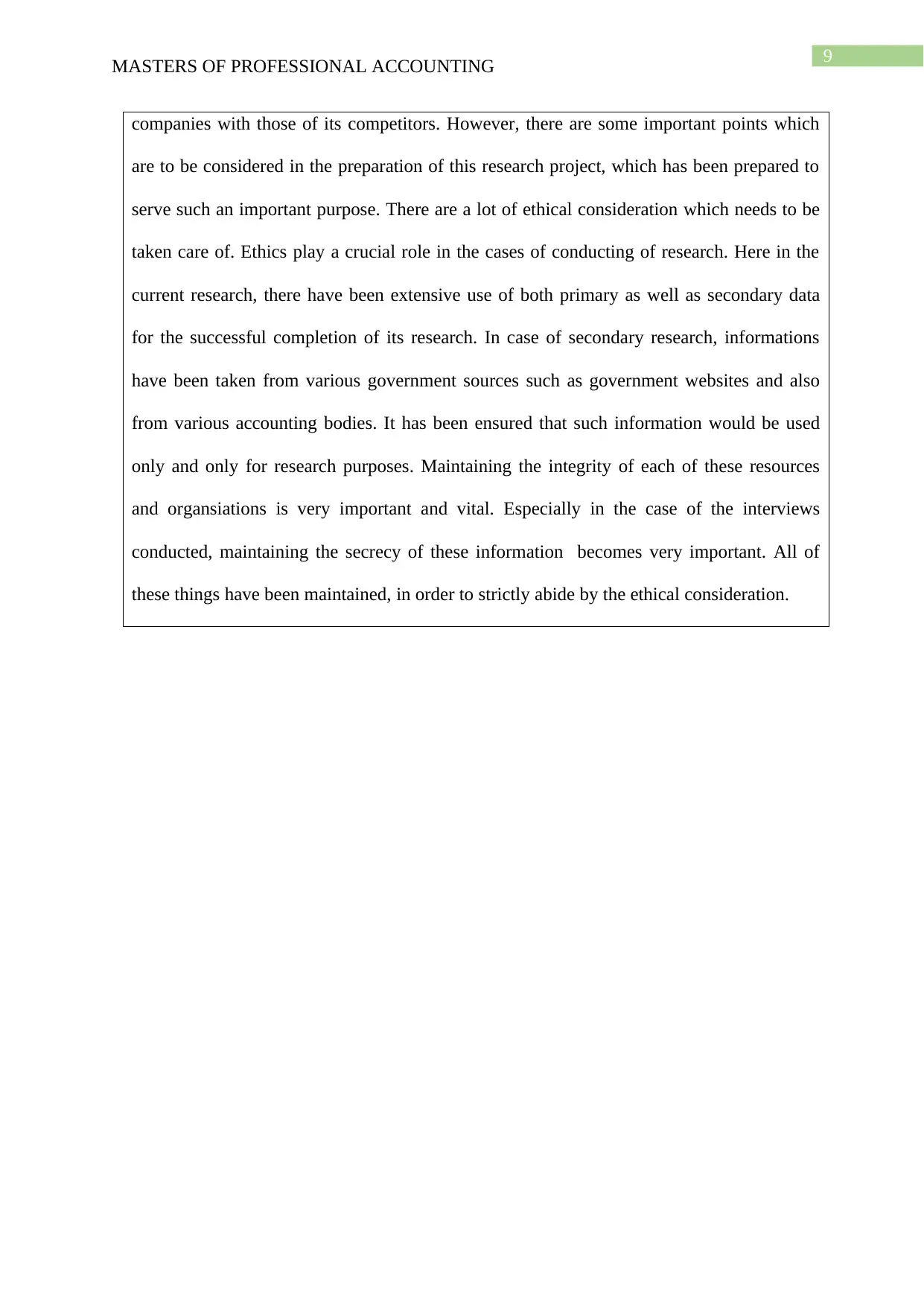
9
MASTERS OF PROFESSIONAL ACCOUNTING
companies with those of its competitors. However, there are some important points which
are to be considered in the preparation of this research project, which has been prepared to
serve such an important purpose. There are a lot of ethical consideration which needs to be
taken care of. Ethics play a crucial role in the cases of conducting of research. Here in the
current research, there have been extensive use of both primary as well as secondary data
for the successful completion of its research. In case of secondary research, informations
have been taken from various government sources such as government websites and also
from various accounting bodies. It has been ensured that such information would be used
only and only for research purposes. Maintaining the integrity of each of these resources
and organsiations is very important and vital. Especially in the case of the interviews
conducted, maintaining the secrecy of these information becomes very important. All of
these things have been maintained, in order to strictly abide by the ethical consideration.
MASTERS OF PROFESSIONAL ACCOUNTING
companies with those of its competitors. However, there are some important points which
are to be considered in the preparation of this research project, which has been prepared to
serve such an important purpose. There are a lot of ethical consideration which needs to be
taken care of. Ethics play a crucial role in the cases of conducting of research. Here in the
current research, there have been extensive use of both primary as well as secondary data
for the successful completion of its research. In case of secondary research, informations
have been taken from various government sources such as government websites and also
from various accounting bodies. It has been ensured that such information would be used
only and only for research purposes. Maintaining the integrity of each of these resources
and organsiations is very important and vital. Especially in the case of the interviews
conducted, maintaining the secrecy of these information becomes very important. All of
these things have been maintained, in order to strictly abide by the ethical consideration.
1 out of 10
Related Documents
Your All-in-One AI-Powered Toolkit for Academic Success.
+13062052269
info@desklib.com
Available 24*7 on WhatsApp / Email
![[object Object]](/_next/static/media/star-bottom.7253800d.svg)
Unlock your academic potential
Copyright © 2020–2025 A2Z Services. All Rights Reserved. Developed and managed by ZUCOL.





